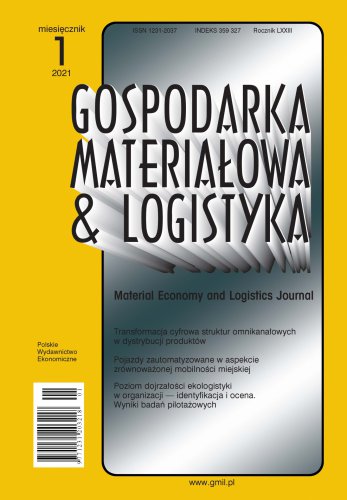The level of maturity of ecologistics in the organization — identification and assessment. Results of the pilot studies
Management concepts that postulate reducing the negative impact of the economy on the natural environment, such as corporate social responsibility or sustainable development, are no longer just ideas that create the image of an organization, as they increasingly affect the level of its competitiveness, attractiveness for the recipient and value for stakeholders. Business entities that notice this trend are looking for new management solutions that will help to effectively implement the principles of green order and at the same time build the value of the organization. One of such solutions is ecologistics, discussed in this article. The aim of the article is to present the results of pilot studies on the advancement level of ecologistics in the companies of the Euroregion Nysa, in which the original model of ecologistics maturity in an enterprise was used. The pilot study was aimed at preparing research hypotheses for further research, as well as verifying the correctness of the theoretical model and the research tool in terms of content and form.
References
Bibliografia/References
Literatura/Literature
Baraniecka, A. (2018). Ekologistyka, W: J. Witkowski, A. Baraniecka (red.). Japońskie łańcuchy dostaw w Europie. Zarządzanie i rozwój. Warszawa: Polskie Wydawnictwo Ekonomiczne, 264–266.
Baraniecka, A. (2019a). Ekologistyka jako odpowiedź przedsiębiorstw na kryzys środowiskowy. Marketing i Rynek, (11), 3–14. https://doi.org/10.33226/1231-7853.2019.11.1
Baraniecka, A. (2019b). Space Logistics — Current Status and Perspectives, Modelling of Logistics Processes and Systems. Part XXI, Research Journal of the University of Gdańsk. Transport Economics and Logistics, 82, 67–78.
Borek, R. (2016), Powstawanie i rozprzestrzenianie śmieci kosmicznych w świetle przepisów Unii Europejskiej. Obronność — Zeszyty Naukowe Wydziału Zarządzania i Dowodzenia Akademii Obrony Narodowej, 1(17), 17–30
Choi, Y., Zhang, N., (2011). Does proactive green logistics management improve business performance? A case of Chinese logistics enterprises, African Journal of Business Management, 5 (17), 7564–7574. https://doi.org/10.5897/ajbm11.613
Dekker, R., Bloemhof, J., Mallidis, I., (2012). Operations research for green — An overview of aspects, issues, contributions and challenges. European Journal of Operational Research, 219, 671–679.
Dyczkowska, J., Reshetnikova, O. (2019). New technological solutions in logistics on the example of logistics operators in Poland and Ukraine. W: A. Kawa, A. Maryniak (red.), Smart Supply Network. Springer International Publishing, 47. https://doi.org/10.1007/978-3-319-91668-2_3
Jakubiak, M. (2016). The improvement in collection of municipal waste on the example of a chosen municipality. W: S. Iwan, R. G. Thompson; K. Kijewska (red.), 2nd International Conference Green Cities — Green Logistics For Greener Cities. Transportation Research Procedia, 16, 122–129. https://doi.org/10.1016/j.trpro. 2016.11.001
Korzeń Z. (2001). Ekologistyka. Poznań: Instytut Logistyki i Magazynowania, 17–18.
Kumar, A. (2015). Green Logistics for sustainable development: an analytical review. IOSRD International Journal of Business, 1(1), 7–13.
Lee, I., Su-Yol, Klassen, R. -D. (2008). Drivers and enablers that foster environmental management capabilities in small- and medium-sized suppliers in supply chains. Production and Operations Management Society, (17), http://www.econstor.eu (31.12.2020).
Lin, Ch. -Y., Ho, Y. -H. (2011). Determinants of green practice adoption for logistics companies in China. Journal of Business Ethics, 98, 67–83. https://doi.org/10.1007/s10551-010-0535-9
Mesjasz-Lech, A. (2011). Forecasting of demand for direct production materials as the element of supply logistics of thermal power plants. LogForum, 7(2), 51–61.
Michniewska, K. (2012). Ekologistyka. Praktyczne wykorzystanie w biznesie. Logistyka odzysku, 1(2), 11–13.
Pabian, A. (2015). Proposal for the use of morphology to refine problematic issues from ecologistics scope, 4th IEEE International Conference on Advanced Logistics and Transport (ICALT), 156–160. https://doi.org/10.1109/icadlt.2015.7136608
Piniecki, R. (2002). Realizacja zasad ekologistyki, W: D. Kisperska-Moroń, E. Płaczek, R. Piniecki (red.), Koszty zewnętrzne logistyki w zarządzaniu łańcuchem dostaw. Katowice: Wydawnictwo Akademii Ekonomicznej w Katowicach, 117.
PSDB (2008). Potencjał małych i średnich przedsiębiorstw w dziedzinie kreowania nowych produktów innowacyjnych — rozwiązania proekologiczne. Warszawa: PSDB, Grupa WYG.
Rodrigue, J. P., Slack, B. and Claude, C. (2001). Green Logistics. W: A. M. Brewer, K. J. Button, D. A. Hensher (eds), Handbook of Logistics and Supply-Chain Management. Pergamon, 339–350. https://doi.org/10.1108/9780080435930-021
Sibihi, A., Eglese, R. W. (2009). Combinatorial optimization and Green Logistics. Annals of Operations Research, 175(1), 159–175. https://doi.org/10.1007/s10479-009-0651-z
Seuring, S., Müller, M. (2008). From a literature review to a conceptual framework for sustainable supply chain management. Journal of Cleaner Production, 16(15), 1699–1710. https://doi.org/10.1016/j.jclepro. 2008.04.020
Słupik, S. (2014). Ekologiczna społeczna odpowiedzialność biznesu w strategiach rozwoju firm. Gospodarka w Praktyce i Teorii, (3), 87. https://doi.org/10.18778/1429-3730.36.06
Ubeda, S. Arcelus, F. J., Faulin, J. (2011). Green logistics at Eroski: A case study. International Journal Production Economics, 131, 44–51. https://doi.org/10.1016/j.ijpe.2010.04.041
Zuzek, D. K. (2017). Świadomość ekologiczna przedsiębiorców jako element zrównoważonego rozwoju. Studia Ekonomiczne, Zeszyty Naukowe Uniwersytetu Ekonomicznego w Katowicach, 326, 166–169.
Źródła internetowe/ Internet sources:
http://www.euroregion-nysa.eu/podstawowe-informacje

